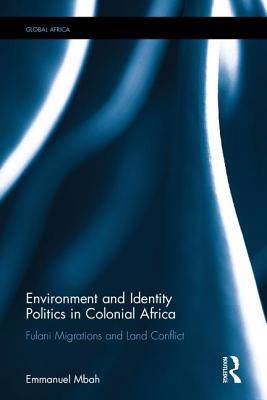
- Afhalen na 1 uur in een winkel met voorraad
- Gratis thuislevering in België vanaf € 30
- Ruim aanbod met 7 miljoen producten
- Afhalen na 1 uur in een winkel met voorraad
- Gratis thuislevering in België vanaf € 30
- Ruim aanbod met 7 miljoen producten
Environment and Identity Politics in Colonial Africa
Fulani Migrations and Land Conflict
Emmanuel MbahOmschrijving
Economic, political, and ethnic favoritism are common themes in the historiography of colonial Africa. Land ownership and control, and the abilities of the respective landscapes to sustain Africa's growing population amidst the throes of climate change, have created recurrent identity crises throughout Africa.
The book's chapters elevate the discussion on recurrent environmental issues, the problems of contested ownership of land, autochthonism as well as the interaction and blending of different cultures in a restricted geographical space. The study highlights a neglected aspect of the history of Fulani migrations in West Africa - the colonial extension of the Fulani into the Southern Cameroons (the Fulani as a group did not exist in the region prior to 1916). Therefore the introduction of the Fulani in the region, at a time when ethnic affinities and control over land had already crystallized, resulted in problems of a wider magnitude that have been carefully and meticulously addressed in this book.
Environment and Identity Politics in Colonial Africa makes a major contribution to colonial African historiography. It will be of interest to students and scholars of Modern Africa, African Environmental History and Colonial History
Specificaties
Betrokkenen
- Auteur(s):
- Uitgeverij:
Inhoud
- Aantal bladzijden:
- 186
- Taal:
- Engels
- Reeks:
Eigenschappen
- Productcode (EAN):
- 9781138239555
- Verschijningsdatum:
- 19/12/2016
- Uitvoering:
- Hardcover
- Formaat:
- Genaaid
- Afmetingen:
- 160 mm x 236 mm
- Gewicht:
- 476 g

Alleen bij Standaard Boekhandel
Beoordelingen
We publiceren alleen reviews die voldoen aan de voorwaarden voor reviews. Bekijk onze voorwaarden voor reviews.











